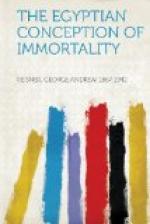As a part of the magical provisions of the dead, the Osiris myth, probably built up in explanation of old rites, was drawn into the belief in a future life, and apparently at the beginning solely for the benefit of the king, for the benefit of those who claimed a certain divinity on earth. The earth-god Osiris, god of the living, had died and had been brought to life as god of the dead. So, also, the earth-king, the Horus, the son of Ra, must die, but he also would live again in the other world and share the throne of Osiris. More than this even, he became Osiris. He was admitted to the life of the gods. Of course the ideas of the existence of the gods were never clear and consistent. They lived in secret places, their whole life was mysterious as well as powerful. These are the field of knowledge which the Egyptian mind could not oversee with any satisfaction to itself. The most it could do was to formulate the magic words, invoking the names of the gods and conjuring them by the events in the Osiris myth to accept this king as Osiris. The exceptional man, the super-man, must have an exceptional future life; but to obtain it, he must have the knowledge of the names and words necessary to force the powers of the other world.
Thus the idea of an exceptional future life, a heaven, was brought into the Egyptian conception of life after death. Admission to it depended on the exceptional position on earth of those admitted. As even this exceptional position was only of avail when combined with the knowledge of certain formulas, it is not difficult to see how the knowledge of these formulas might be considered sufficient to obtain the better future life, even for others than the king. When in the depression that followed the extravagance of the pyramid age the central monarchy lost its power, Egypt broke up into a series of tribal baronies (nomes). In each was a ruler almost independent of the king, a man who might presume with the proper knowledge to claim a glorified future life similar to that of the king. And, indeed, we find from the burial inscriptions of the Middle Empire that such was the result. Feudalism extended the possibilities of heaven to the great nobles. In the New Empire, the royal power was gradually absorbed by the priestly organization of the national religion— the religion of Amon-Ra; and the principle comes into practice that any priest having the necessary knowledge could obtain for himself an exceptional place in the future life. The Osirian burial customs spread even among the people. The swathed body extended on the back becomes universal, even though true mummification was still only for the rich.
In the Ptolemaic period, the preparation of all the apparatus of the Osiris burial was divided up into trades. Factories, one may say, turned out mummy cases of various kinds, with a scale of prices to fit every purse. Other factories turned out amulets and charms. Magical texts, the preparation of the body, the construction of the grave—all things were done by regular crafts. The cheapening of the apparatus is most striking. At the same time all but the poorest burials bear direct evidence of their character as Osiris burials.




